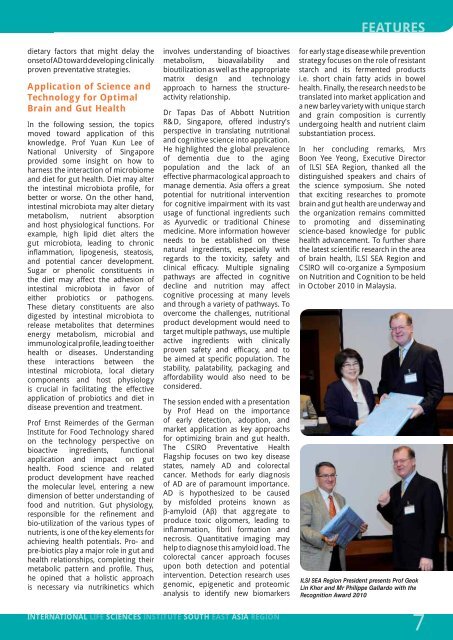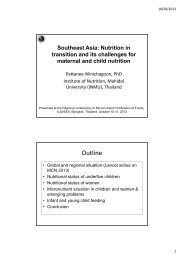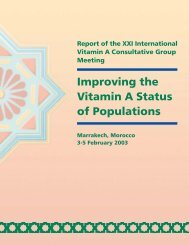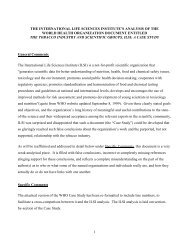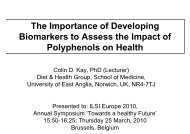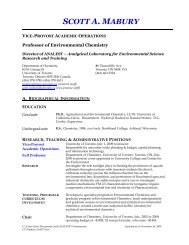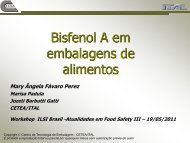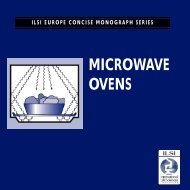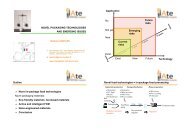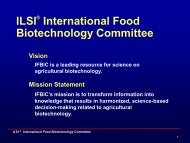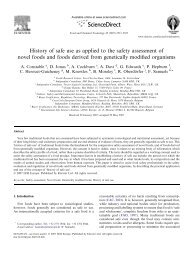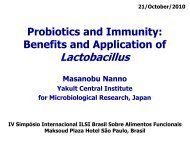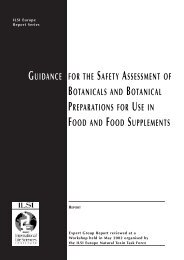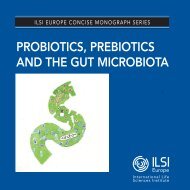ILSI Southeast Asia Region Newsletter - International Life Sciences ...
ILSI Southeast Asia Region Newsletter - International Life Sciences ...
ILSI Southeast Asia Region Newsletter - International Life Sciences ...
Create successful ePaper yourself
Turn your PDF publications into a flip-book with our unique Google optimized e-Paper software.
FEATURESdietary factors that might delay theonset of AD toward developing clinicallyproven preventative strategies.Application of Science andTechnology for OptimalBrain and Gut HealthIn the following session, the topicsmoved toward application of thisknowledge. Prof Yuan Kun Lee ofNational University of Singaporeprovided some insight on how toharness the interaction of microbiomeand diet for gut health. Diet may alterthe intestinal microbiota profile, forbetter or worse. On the other hand,intestinal microbiota may alter dietarymetabolism, nutrient absorptionand host physiological functions. Forexample, high lipid diet alters thegut microbiota, leading to chronicinflammation, lipogenesis, steatosis,and potential cancer development.Sugar or phenolic constituents inthe diet may affect the adhesion ofintestinal microbiota in favor ofeither probiotics or pathogens.These dietary constituents are alsodigested by intestinal microbiota torelease metabolites that determinesenergy metabolism, microbial andimmunological profile, leading to eitherhealth or diseases. Understandingthese interactions between theintestinal microbiota, local dietarycomponents and host physiologyis crucial in facilitating the effectiveapplication of probiotics and diet indisease prevention and treatment.Prof Ernst Reimerdes of the GermanInstitute for Food Technology sharedon the technology perspective onbioactive ingredients, functionalapplication and impact on guthealth. Food science and relatedproduct development have reachedthe molecular level, entering a newdimension of better understanding offood and nutrition. Gut physiology,responsible for the refinement andbio-utilization of the various types ofnutrients, is one of the key elements forachieving health potentials. Pro- andpre-biotics play a major role in gut andhealth relationships, completing theirmetabolic pattern and profile. Thus,he opined that a holistic approachis necessary via nutrikinetics whichinvolves understanding of bioactivesmetabolism, bioavailability andbioutilization as well as the appropriatematrix design and technologyapproach to harness the structureactivityrelationship.Dr Tapas Das of Abbott NutritionR&D, Singapore, offered industry’sperspective in translating nutritionaland cognitive science into application.He highlighted the global prevalenceof dementia due to the agingpopulation and the lack of aneffective pharmacological approach tomanage dementia. <strong>Asia</strong> offers a greatpotential for nutritional interventionfor cognitive impairment with its vastusage of functional ingredients suchas Ayurvedic or traditional Chinesemedicine. More information howeverneeds to be established on thesenatural ingredients, especially withregards to the toxicity, safety andclinical efficacy. Multiple signalingpathways are affected in cognitivedecline and nutrition may affectcognitive processing at many levelsand through a variety of pathways. Toovercome the challenges, nutritionalproduct development would need totarget multiple pathways, use multipleactive ingredients with clinicallyproven safety and efficacy, and tobe aimed at specific population. Thestability, palatability, packaging andaffordability would also need to beconsidered.The session ended with a presentationby Prof Head on the importanceof early detection, adoption, andmarket application as key approachsfor optimizing brain and gut health.The CSIRO Preventative HealthFlagship focuses on two key diseasestates, namely AD and colorectalcancer. Methods for early diagnosisof AD are of paramount importance.AD is hypothesized to be causedby misfolded proteins known asβ-amyloid (Aβ) that aggregate toproduce toxic oligomers, leading toinflammation, fibril formation andnecrosis. Quantitative imaging mayhelp to diagnose this amyloid load. Thecolorectal cancer approach focusesupon both detection and potentialintervention. Detection research usesgenomic, epigenetic and proteomicanalysis to identify new biomarkersINTERNATIONAL LIFE SCIENCES INSTITUTE SOUTH EAST ASIA REGIONfor early stage disease while preventionstrategy focuses on the role of resistantstarch and its fermented productsi.e. short chain fatty acids in bowelhealth. Finally, the research needs to betranslated into market application anda new barley variety with unique starchand grain composition is currentlyundergoing health and nutrient claimsubstantiation process.In her concluding remarks, MrsBoon Yee Yeong, Executive Directorof <strong>ILSI</strong> SEA <strong>Region</strong>, thanked all thedistinguished speakers and chairs ofthe science symposium. She notedthat exciting researches to promotebrain and gut health are underway andthe organization remains committedto promoting and disseminatingscience-based knowledge for publichealth advancement. To further sharethe latest scientific research in the areaof brain health, <strong>ILSI</strong> SEA <strong>Region</strong> andCSIRO will co-organize a Symposiumon Nutrition and Cognition to be heldin October 2010 in Malaysia.<strong>ILSI</strong> SEA <strong>Region</strong> President presents Prof GeokLin Khor and Mr Philippe Gallardo with theRecognition Award 20107


